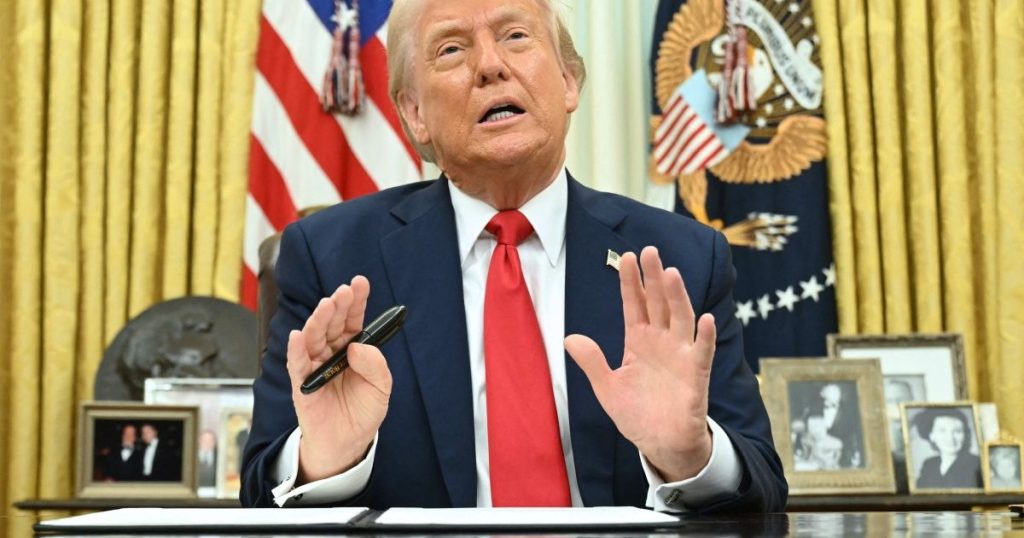President Donald Trump’s executive order targeting National Public Radio (NPR) and the Public Broadcasting Service (PBS) represents a significant escalation in his ongoing conflict with mainstream media outlets. The order, signed on Thursday, directs the Corporation for Public Broadcasting (CPB) and all executive departments and agencies to halt federal funding to both NPR and PBS. Trump justified his decision by accusing the broadcasters of biased reporting, claiming they fail to provide taxpaying citizens with a fair, accurate, or unbiased portrayal of current events. This action amplifies Trump’s long-standing adversarial relationship with much of the media, which he has frequently labeled as the “enemy of the people.” However, this combative stance notably excludes Fox News, a powerful conservative broadcaster whose personalities have secured prominent roles within the Trump administration.
The executive order itself raises practical and legal questions regarding its enforceability. Congress has already approved the CPB budget through 2027, which creates a potential conflict with the President’s directive. The CPB serves as a conduit for federal funding to both NPR and PBS, but these organizations also rely heavily on private donations, corporate sponsorships, and listener contributions. According to NPR, federal funding represents a relatively small portion of their overall budget. NPR director Katherine Maher estimated that in 2025, the radio station would receive approximately $120 million from the CPB, accounting for less than five percent of its total budget. PBS also receives a significant portion of its funding from non-federal sources, including member stations, foundations, and individual donors. Therefore, the immediate impact of Trump’s order on the operations of NPR and PBS remains unclear, pending further legal and legislative review.
The broader implications of this executive order extend beyond the immediate financial concerns of NPR and PBS. It touches upon fundamental principles of press freedom and the role of public broadcasting in a democratic society. Critics of the order argue that it constitutes a politically motivated attack on independent journalism and represents an attempt to silence voices that offer perspectives differing from the administration’s narrative. They emphasize the importance of diverse and independent news sources as essential components of a well-informed citizenry. Supporters of the order, however, echo Trump’s accusations of bias and contend that taxpayer dollars should not be used to fund organizations they perceive as promoting partisan viewpoints. This debate highlights the ongoing tension between the government and the press, particularly during administrations critical of media coverage.
Trump’s targeting of NPR and PBS further underscores the evolving landscape of media consumption and the increasing fragmentation of news sources. In the digital age, where information is readily accessible through a multitude of platforms, the traditional role of public broadcasting has come under scrutiny. The rise of cable news networks, online news outlets, and social media platforms has created a highly competitive media environment, challenging the dominance of established institutions like NPR and PBS. While these public broadcasters continue to maintain a substantial audience, reaching millions of Americans weekly through radio and television, they face the challenge of adapting to changing consumption habits and competing for relevance in a crowded media marketplace.
The timing of Trump’s executive order also warrants consideration. Issued in the waning days of his presidency, it serves as a final salvo in his protracted battle with the media. This action further solidifies his legacy as a president who consistently challenged established norms and institutions, including the press. The long-term consequences of this order, including its potential impact on future presidential administrations and their interactions with the media, remain to be seen. It will be up to the incoming administration and Congress to determine the fate of federal funding for NPR and PBS and to navigate the broader issues surrounding press freedom and the role of public broadcasting in the 21st century.
Finally, the international reaction to Trump’s order reflects a growing global concern about press freedom. Organizations such as Reporters Without Borders (RSF) have expressed alarm over what they perceive as a deteriorating environment for journalists in the United States under the Trump administration. RSF has highlighted the unprecedented challenges faced by independent journalists around the world and has criticized Trump’s rhetoric and actions towards the media. The concern extends beyond the borders of the United States, with international observers noting the potential for Trump’s actions to embolden other leaders who seek to restrict press freedom and silence dissenting voices. The defense of a free and independent press remains a crucial component of democratic societies, and the international community continues to monitor developments in the United States with great interest.


